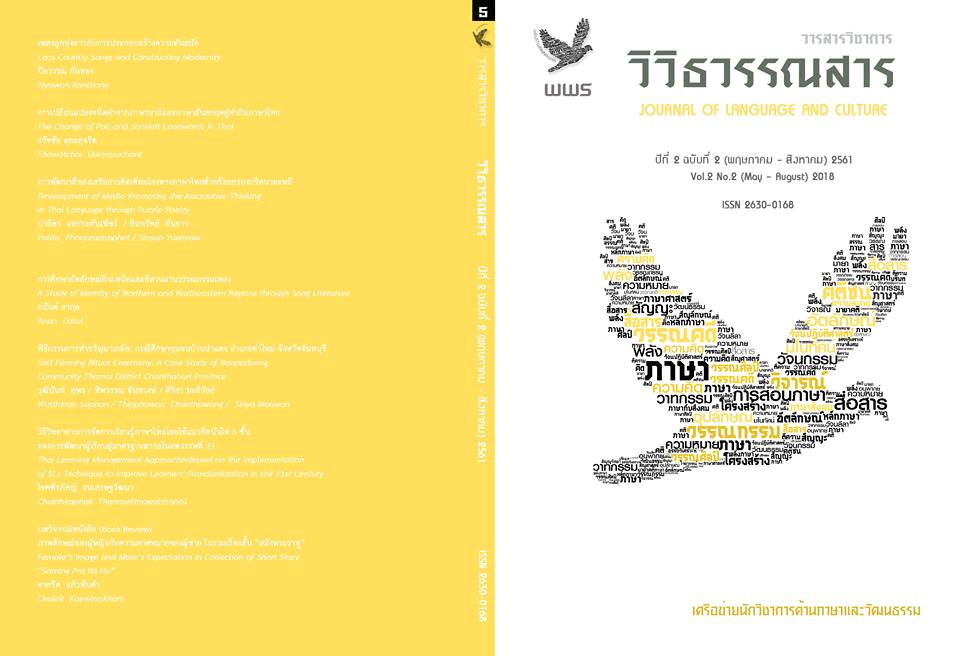การพัฒนาสื่อส่งเสริมการคิดเชื่อมโยงทางภาษาไทยด้วยร้อยกรองปริศนาผะหมี
Main Article Content
บทคัดย่อ
การวิจัยในครั้งนี้มีวัตถุประสงค์ 1) เพื่อพัฒนาสื่อส่งเสริมการคิดเชื่อมโยงทาง ภาษา ด้วยปริศนาร้อยกรองผะหมีที่มีประสิทธิภาพตามเกณฑ์ 80/80 2) เพื่อเปรียบเทียบ ผลสัมฤทธิ์ทางการคิดเชื่อมโยงทางภาษาก่อนและหลังได้รับการพัฒนาด้วยสื่อส่งเสริมการคิด และ 3) เพื่อศึกษาความพึงพอใจของนักเรียนชั้นมัธยมศึกษาปีที่ 2 ที่มีต่อการจัดกิจกรรมส่ง เสริมทักษะการเชื่อมโยงทางภาษาด้วยปริศนาร้อยกรองผะหมี กลุ่มตัวอย่างที่ใช้ในการศึกษา คือ นักเรียนชั้นประถมศึกษาปีที่ 2/2 โรงเรียนมัธยมพรสำราญ ภาคเรียนที่ 1 ปีการศึกษา 2561 รวม 22 คน เครื่องมือในการเก็บรวบรวมข้อมูล คือ สื่อส่งเสริมการคิดเชื่อมโยงทาง ภาษาไทย ด้วยปริศนาร้อยกรองปริศนาผะหมี และแบบทดสอบก่อน-หลังเรียน วิเคราะห์ ข้อมูลทางสถิติ ผลการศึกษา พบว่า สื่อส่งเสริมการคิดเชื่อมโยงทางภาษา ด้วยปริศนาร้อยกรอง ผะหมีมีประสิทธิภาพตามเกณฑ์เท่ากับ 80.06/80.15 ซึ่งสูงกว่าเกณฑ์ที่ตั้งไว้ 80/80 ด้าน ผลสัมฤทธิ์ทางการคิดเชื่อมโยงทางภาษาก่อนและหลังได้รับการพัฒนาด้วยสื่อส่งเสริมการ คิด มีค่าประสิทธิผลเท่ากับ 0.6658 หรือคิดเป็นร้อยละ 66.58 หมายความว่า นักเรียน มีพัฒนาการเพิ่มขึ้นจากก่อนเรียน และความพึงพอใจของนักเรียนชั้นมัธยมศึกษาปีที่ 2 ที่มี ต่อการจัดกิจกรรมส่งเสริมทักษะการเชื่อมโยงทางภาษาด้วยปริศนาร้อยกรองผะหมี อยู่ใน ระดับ “มากที่สุด” มีค่าเฉลี่ยเท่ากับ 4.67
Article Details
ลิขสิทธิ์ของบทความเป็นของวารสาร การพิมพ์ซ้ำจะต้องได้ร้บการอนุญาตจากบรรณาธิการวารสาร
เอกสารอ้างอิง
phatthana thaksa kan phut samrap dek pathommawai chan
anuban 2 rong rian ban thamthian (Sukpracharat). (in Thai)
[A study of Riddle to develop skill of speaking of early
childhood , Kindergarten 2 of Ban Thamthain School (Sukpracharat)].
Phatthalung: Banthamthian (Sukpracharat).
Sisa-at, B. (2011). Kan wichai bueang ton. (inThai) [Introduction to Research].
(7th ed.). Bangkok: Suwiriyasan.
Tanthikun, R. (2013). A comparison of prathomsuksavi students’ analytical
thinking ability and interest in learning through the instructions
using riddle joke technique and traditional teaching methods.
Master’s thesis. Srinakharinwirot University, Bangkok.
Thapthan, S. (2007). Kan sueksa rup baep nuea ha lae konwithi kan
nam sanoe phasa lae wannakam. (in Thai) [A study of form,
content, presentation technique of Thai language and literature
on internet]. Bangkok: National Research Council of Thailand.
The Royal Institute. (2003). Photchananukrom chabap
ratchabandittayasathan Phoso 2542. (in Thai) [Thai Dictionary
of Royal Institute, AD.1999]. (2nded.) Bangkok: Charoen That.
Thithachunhathian, R.(1988). Kham long thai nai phasa thin Changwat
Khon Kaen. (in Thai) [A final Particle in Khonkaen Dialect].
KhonKaen: Faculty of Humanities and Social Sciences,
KhonKaen University.


